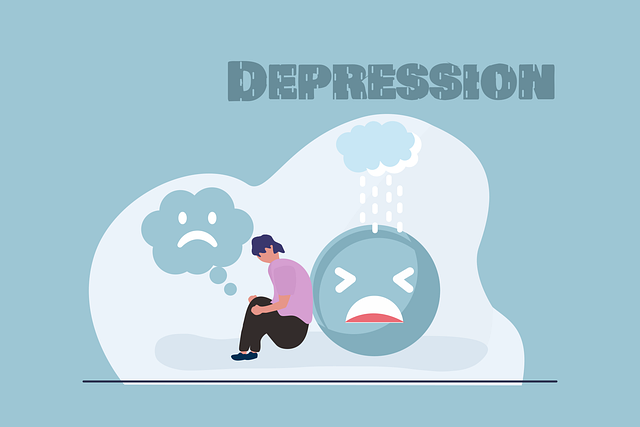Mental health policies play a pivotal role in shaping societal responses to conditions like depression and anxiety, influencing funding, treatment availability, and public perception. Initiatives such as Lafayette Acceptance and Commitment Therapy (ACT) programs foster open conversations about mental wellness, reducing stigma. These policies impact families, workplaces, and communities, encouraging evidence-based Mental Wellness Coaching, Awareness, and positive thinking. Strong mental health policies enhance accessibility and quality of care, ensuring support is readily available when needed. By analyzing existing policies, advocates can identify gaps and advocate for improvements, including Lafayette ACT practices. Community outreach programs bring tailored care to underserved populations, while measuring success involves assessing emotional resilience and life satisfaction over time. A holistic approach combining policy reforms, interventions, and public engagement is crucial for lasting change in mental healthcare.
Mental health policy analysis and advocacy are vital components in fostering effective care systems. This article explores key aspects, from understanding the profound impact of mental health policies to evaluating their success. We delve into innovative approaches like Lafayette Acceptance and Commitment Therapy (ACT), demonstrating its promise in treatment. Additionally, we examine existing policies, provide advocacy strategies to drive change, and emphasize measuring progress for tangible improvements in mental healthcare accessibility and quality.
- Understanding Mental Health Policy and its Impact
- Lafayette Acceptance and Commitment Therapy: A Promising Approach
- Analyzing Existing Mental Health Policies
- Advocacy Strategies for Better Mental Health Care
- Measuring Success and Bringing About Change
Understanding Mental Health Policy and its Impact

Mental health policies play a pivotal role in shaping societal attitudes and access to care for individuals grappling with various mental health conditions. These policies directly influence funding allocation, treatment availability, and public perception, ultimately determining the effectiveness of support systems. By prioritizing mental wellness through initiatives like Lafayette Acceptance and Commitment Therapy (ACT) programs, communities can foster a culture of open dialogue and understanding, reducing the stigma associated with seeking help.
The impact of robust mental health policies is far-reaching, affecting not just individuals but also families, workplaces, and entire communities. They drive the development of evidence-based Mental Wellness Coaching Programs, promote Mental Health Awareness, and encourage positive thinking as a proactive approach to well-being. Such policies have the potential to revolutionize mental healthcare accessibility and quality, ensuring that support is readily available when needed most.
Lafayette Acceptance and Commitment Therapy: A Promising Approach

In recent years, Lafayette Acceptance and Commitment Therapy (ACT) has emerged as a promising approach within mental health policy advocacy. This therapeutic model emphasizes the importance of acceptance, mindfulness, and commitment to valued actions, offering a unique perspective on addressing various psychological disorders. By fostering emotional intelligence and enhancing mental health awareness, ACT encourages individuals to live more fulfilling lives despite challenges.
The culture-sensitive nature of Lafayette ACT is particularly notable, as it recognizes the impact of cultural backgrounds on one’s mental well-being. This approach adapts to diverse communities, ensuring that therapeutic practices are inclusive and effective for all. As mental healthcare continues to evolve, embracing such innovative strategies can significantly contribute to improved policy initiatives, ultimately enhancing the accessibility and quality of care for those seeking support for their emotional and psychological needs.
Analyzing Existing Mental Health Policies

Analyzing existing mental health policies is a crucial step in understanding the current landscape and identifying areas for improvement. This process involves scrutinizing laws, regulations, and guidelines related to mental well-being across various sectors, such as healthcare, education, and employment. By examining these policies, advocates can pinpoint disparities and gaps that impact access to quality care, including evidence-based practices like Lafayette Acceptance and Commitment Therapy (ACT).
For instance, a thorough review might reveal insufficient funding for Trauma Support Services, hindering individuals’ ability to receive specialized care. Alternatively, policy analysis could highlight successful initiatives promoting Emotional Regulation in schools, which serves as a model for community-wide mental health enhancement. Such insights are instrumental in shaping advocacy strategies that push for more comprehensive and effective mental health policies.
Advocacy Strategies for Better Mental Health Care

Advocacy plays a pivotal role in shaping mental health policies and ensuring access to quality care. For Lafayette Acceptance and Commitment Therapy (ACT) practitioners, advocacy extends beyond clinical settings, aiming to foster systemic change. One effective strategy is engaging in Mental Illness Stigma Reduction Efforts, which involve public education campaigns and policy initiatives that challenge societal norms and stereotypes associated with mental health struggles. By normalizing conversations around mental wellness, ACT advocates create an environment where individuals feel empowered to seek support without fear of judgment.
Additionally, implementing Community Outreach Program Implementation is a powerful tool to reach underserved populations. These programs can offer evidence-based interventions, such as peer support groups and stress reduction methods, directly within communities. By bringing mental health services to the people, advocates bridge access gaps and ensure that diverse populations receive tailored care. This community-focused approach not only enhances mental well-being but also strengthens social connections, fostering a supportive network that is essential for long-term recovery.
Measuring Success and Bringing About Change

Measuring success in mental health policy is an intricate process that goes beyond mere numbers. It involves assessing the impact on individuals’ lives, communities, and societal well-being. For instance, implementing Lafayette Acceptance and Commitment Therapy (ACT) programs can be evaluated by tracking improvements in clients’ emotional resilience, life satisfaction, and overall mental health status over time. This data-driven approach ensures that policies are effective and tailored to address specific needs.
Bringing about change necessitates a multi-faceted strategy. Stress Management workshops organized by advocacy groups have proven effective in empowering individuals with coping mechanisms. Similarly, Emotional Well-being Promotion Techniques can be integrated into community initiatives to foster mental health awareness and resilience. By combining policy reforms, evidence-based interventions, and public engagement, we can create a more supportive environment for mental health recovery and prevention.
Mental health policy analysis and advocacy are vital components in ensuring accessible, effective, and evidence-based care. By understanding the impact of mental health policies and analyzing existing frameworks, we can identify gaps and areas for improvement. The article has highlighted the potential of Lafayette Acceptance and Commitment Therapy (Lafayette ACT) as a promising approach to enhancing well-being. Effective advocacy strategies are crucial to driving change, and measuring success enables us to bring about sustainable transformations in mental health care systems, ultimately improving lives.














